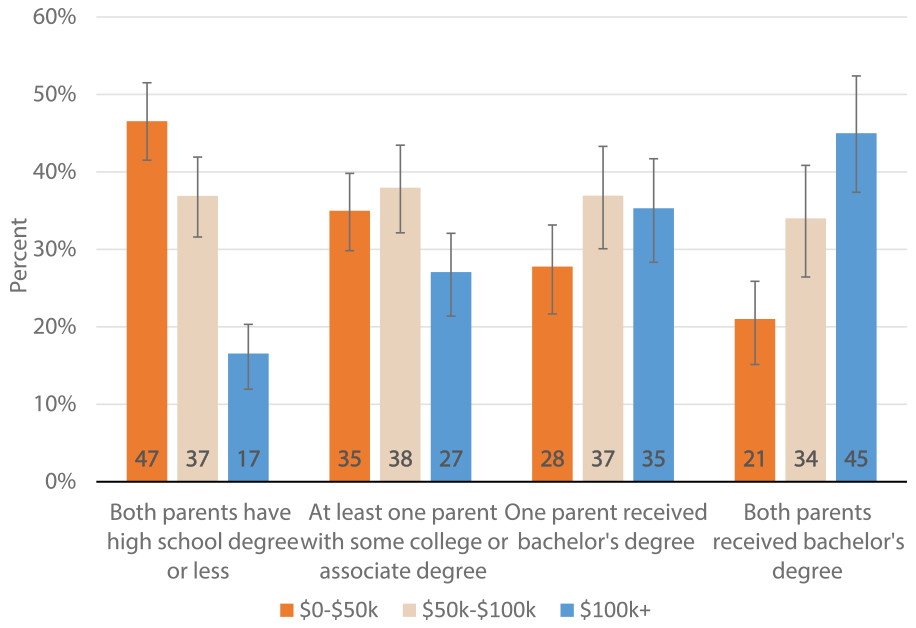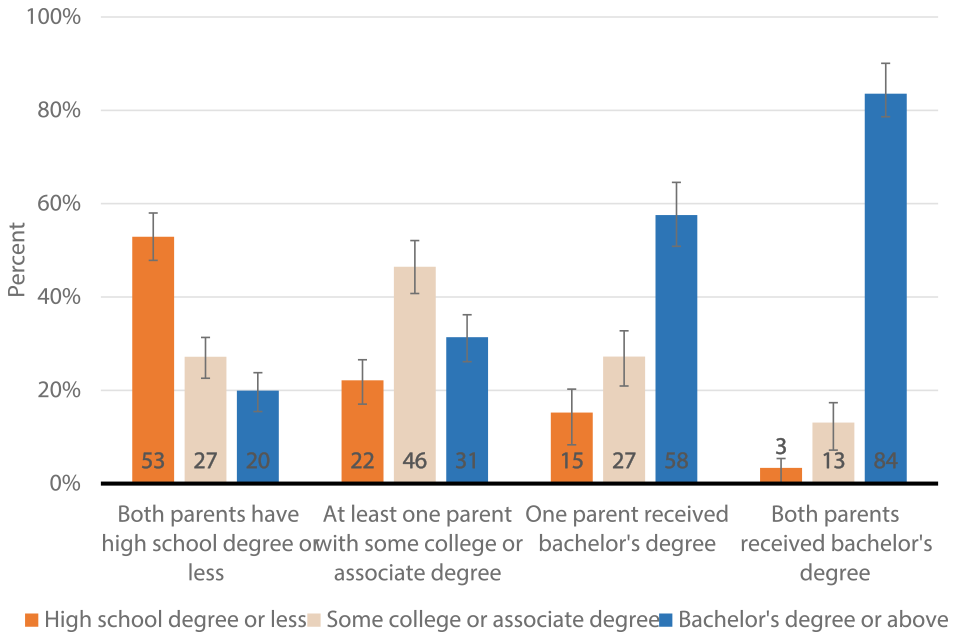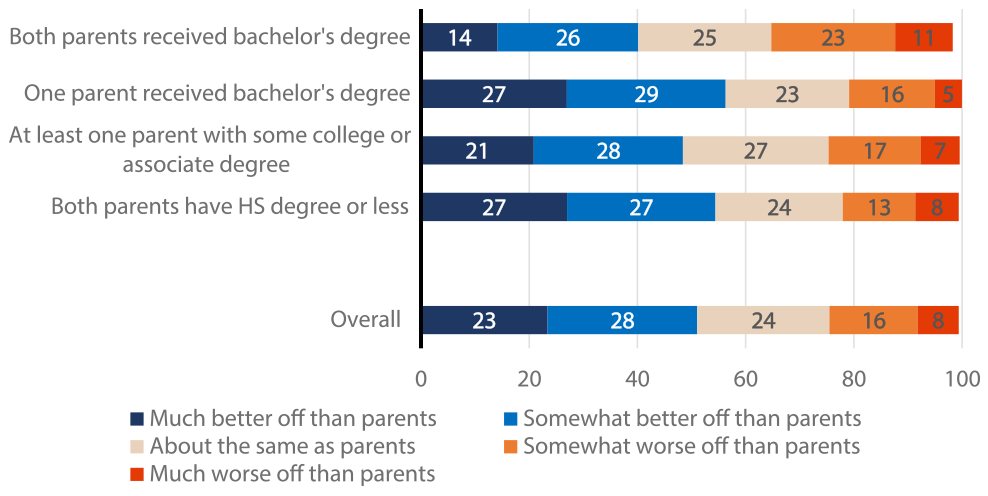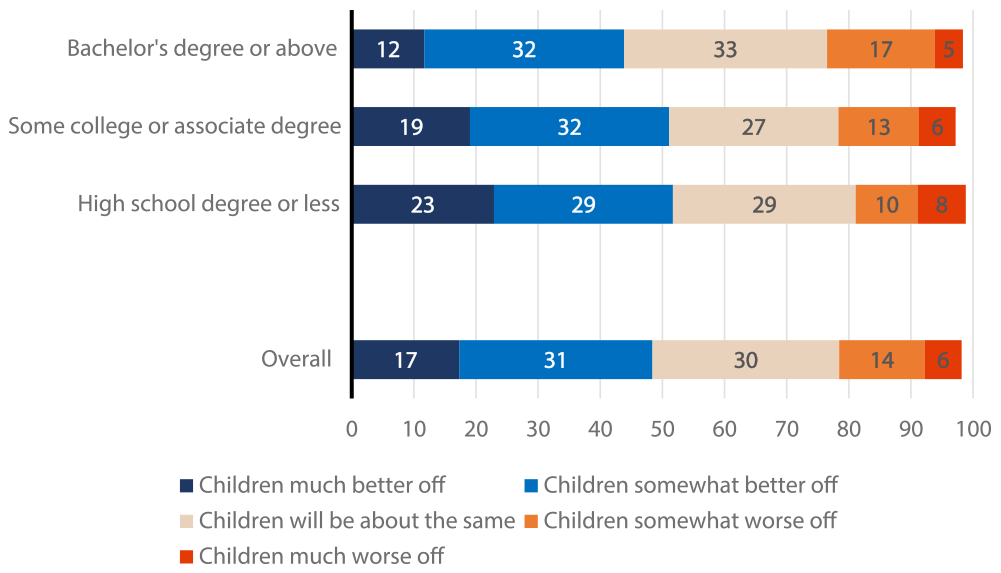FEDS Notes
July 20, 2015
Does it matter who your parents are? Findings on economic mobility from the Survey of Household Economics and Decisionmaking
Jeff Larrimore
Coming out of the Great Recession, there are renewed concerns about the level of economic opportunity throughout the income distribution and the extent to which economic advancement is a realistic goal for all American families. Recognizing this growing interest in economic mobility, this note outlines the findings on several dimensions of mobility for young adults from the Federal Reserve's 2014 Survey of Household Economics and Decisionmaking (SHED).1
Economic mobility over the past generation
The SHED data covers a wide array of topics, including information on the highest level of education that each of the respondent's parents completed. Since education is a strong determinant of income and socioeconomic status (see e.g. Autor 2014; Oreopoulos and Petronijevic 2013), responses to this question can be used in conjunction with other aspects of the survey to observe the level of economic mobility from one generation to the next. In doing so, we focus on individuals aged 25-44 (born between 1970 and 1989) to get a picture of mobility for the latest generation of Americans entering adulthood.2
Figure 1 considers mobility across generations by exploring the relationship between parental education and their child's income as an adult. Among individuals whose parents both completed a bachelor's degree, 21 percent had a household income of under $50,000 in 2014 and 45 percent had over $100,000 of income. In contrast, among individuals for whom neither parent attended college this relationship is reversed. Just 17 percent of these individuals had a household income of over $100,000 while 47 percent made less than $50,000. This strong relationship between parental education and one's own income reflects the extent to which one's family background has a lasting impact on economic outcomes into adulthood.
| Figure 1: Household income, by parents' educational attainment |
|---|
 |
Note: Black lines represent the 95% confidence intervals. Sample limited to respondents age 25-44 who report at least one parent's education. N=1,641
Source: 2014 Survey of Household Economics and Decisionmaking
A large portion of this difference in incomes can be attributed to the intergenerational correlation of education between parents and children. Consistent with that seen in the previous literature (Choy 2001, Reardon 2011), the SHED finds that children of parents who completed a bachelor's degree are substantially more likely to complete a bachelor's degree themselves (Figure 2). However, the SHED data is not limited to simply comparing educational attainment. The survey also asks respondents where they went to college, which enables an additional analysis of how individuals from different family backgrounds differ in the type of institution that they attended.
| Figure 2: Educational attainment, by parents' educational attainment |
|---|
 |
Note: Black lines represent the 95% confidence intervals. Sample limited to respondents age 25-44 who report at least one parentís education. N=1,641
Source: 2014 Survey of Household Economics and Decisionmaking
Young adults who went to college, but whose parents obtained an associate degree or less, were more likely to have attended a for-profit school, and were less likely to have attended a traditional 4-year public or non-profit school, than were children of at least one bachelor's degree recipient (Table 1). Children of parents with lower levels of education were also much more likely to have attended a 2-year, rather than a 4-year, institution. Since there is evidence that the rates of return to education differ by the type of institution attended (Cellini and Chaudhary 2012; Deming, Goldin, and Katz 2012), this may represent a further obstacle towards upward mobility beyond that which comes from just the highest level of education attained.
| Table 1: Type of institution attended, by parents' educational attainment |
|---|
| Sector of institution | Both parents have high school degree or less | At least one parent with some college or associate degree | One parent received bachelor's degree | Both parents received bachelor's degree |
|---|---|---|---|---|
| Public, 4-year | 38.7 | 39.7 | 51.5 | 62.1 |
| (3.9) | (3.3) | (3.8) | (3.9) | |
| Non-profit 4-year | 10.6 | 14.9 | 25.9 | 31.5 |
| (2.3) | (2.4) | (3.4) | (3.8) | |
| For-profit, 4-year | 12.2 | 5.9 | 5.4 | 0.3 |
| (2.9) | (1.6) | (1.5) | (0.2) | |
| Public, 2-year or less | 28.3 | 32.4 | 15.7 | 4.7 |
| (3.5) | (3.3) | (2.8) | (1.4) | |
| For-profit, 2-year or less | 9.1 | 5.9 | 1.4 | 0.3 |
| (2.4) | (1.9) | (1) | (0.3) |
Note: Standard errors in parentheses. Sample limited to respondents age 25-44 who report at least one parent's education and who completed at least some education beyond high school. N=1,021
Source: 2014 Survey of Household Economics and Decisionmaking
To better understand the underlying mechanism for these differences in college attendance and completion decisions, the SHED also asks respondents who did not attend college or did not complete their degree what factors influenced that decision. The most commonly cited reasons vary by the education level of one's parents. In particular, respondents whose parents either did not attend or did not complete college themselves are disproportionately likely to say they did not complete college because it was too expensive (41 percent) or because they had family responsibilities that prevented them from continuing their education (40 percent) (Table 2). In contrast, among those respondents with at least one parent who obtained a bachelor's degree, a lack of interest is the most common reason provided for not attending or completing college (38 percent).
| Table 2: Reason for not attending or not completing college, by parents' educational attainment |
|---|
| Reason for not starting or completing College degree | Both parents have HS degree or less | At least one parent with some college or associate degree | At least one parent received bachelor's degree |
|---|---|---|---|
| Too expensive | 41 | 43.2 | 30.2 |
| (3.6) | (4.7) | (6.1) | |
| Family responsibilities | 39.5 | 35.8 | 27.8 |
| (3.6) | (4.7) | (5.7) | |
| Wanted to work | 30.6 | 23.2 | 21.1 |
| (3.5) | (4) | (5.5) | |
| Wasn't interested | 33.1 | 25 | 37.6 |
| (3.7) | (4) | (6.7) | |
| Low grades / not admitted | 2.6 | 3.2 | 10.5 |
| (1.1) | (1.1) | (3.9) | |
| Didn't think worth the cost | 15.1 | 17.6 | 19.4 |
| (2.7) | (3.7) | (5.5) |
Note: Responses are aggregated responses to questions "Which of the following are reasons why you did not attend college" and "Which of the following are reasons why you did not complete your college degree?" Respondents who had one parent or both parent complete their bachelorís degree are combined due to the relatively small number of respondents whose parents have this level of education but did not complete a college degree themselves. Standard errors in parentheses. Sample limited to respondents age 25-44 who report at least one parent's education and who did not attend college or completed some college but did not complete any degree and are not currently enrolled. N=603.
Source: 2014 Survey of Household Economics and Decisionmaking
The relationships considered thus far emphasize how individual outcomes and educational decisions are influenced by one's starting point in the distribution. They illustrate that one's starting point in life matters, as individuals whose parents were economically better off are more likely to have higher levels of education, are more likely to have attended traditional 4-year non-profit or public institutions, and tend to have higher incomes. This supports findings elsewhere that individuals who start off from a disadvantaged background are less likely to get ahead economically than those whose parents were better off.
However, the observation that one's background growing up is correlated with adult economic outcomes does not preclude the possibility that individuals from a range of backgrounds are still advancing economically relative to their parents. It is possible that individuals' relative positions in the distribution are highly correlated with that of their parents but that the level of well-being is improving for individuals throughout the distribution. To assess this type of absolute mobility from one generation to the next, the SHED asks individuals how they feel they are doing financially relative to how their parents were faring at the same age. Figure 3 shows the responses to this question based the education level of each respondent's parents. As before, the sample is restricted to respondents aged 25-44 to focus on the most recent generation entering adulthood.
| Figure 3: Financial well-being compared to parents, by parents' educational attainment |
|---|
 |
Notes: Responses are to the question: "Think of your parents when they were your age. Would you say you (and your family living with you) are better, the same, or worse off financially than they were?" Responses do not add to 100% due to rounding and non-response. Sample limited to respondents age 25-44 who report at least one parent's education. N=1,641
Source: 2014 Survey of Household Economics and Decisionmaking
Irrespective of the education of one's parents, a plurality of young adults feel that they are better off than their parents were at the same age. Overall, 51 percent of all individuals aged 25-44 report that they are better off than their parents, while only 24 percent indicate that they are worse off. Additionally, the frequency with which respondents feel that they are better off than their parents is largely consistent across socioeconomic starting points, with the exception of individuals for whom both parents completed their bachelor's degree. Among those young adults with two parents who obtained a bachelor's degree, only 40 percent believe that they are doing somewhat or much better off than their parents at the same age. This is a significantly lower fraction feeling that they are better off than is observed among those for whom neither parent had a college education (54 percent).
These results seem to suggest that individuals from lower socioeconomic backgrounds perceive themselves to be advancing in absolute terms at a similar or greater frequency than those from higher socioeconomic backgrounds. However, it is important to qualify this observation by noting the lower threshold that individuals from lower socioeconomic backgrounds must pass in order to improve financially relative to their parents. Additionally, this measure also provides only limited information on the magnitude of economic advancement, so we cannot say with certainty how much better or worse off respondents are than their parents and whether this differs by one's socioeconomic background.
Expectations for economic mobility in the next generation
Just as we explored whether young adults coming from different economic starting points feel that they are better off than their parents, we can explore how young adults expect that their children will fare based on the economic starting point being provided to them. Figure 4 shows the results of asking young adults whether they expect their children (or the next generation of their family) to be better or worse off financially than they are. It separates the responses based on each respondent's level of education, so similar to Figure 3, it assesses the expected economic advancement of an individual (now the respondent's children) based on the education of their parent (now the respondents themselves).
| Figure 4: Expectations of the financial well-being of the next generation of your family, by own educational attainment |
|---|
 |
Notes: Responses are to the question: "Think about the next generation of your family (e.g. your children, nieces, nephews, etc.). When they are your age, do you think that they will be better off, the same, or worse off financially than you are today?" Responses do not add to 100% due to rounding and non-response. Sample limited to respondents age 25-44. N=1,743
Source: 2014 Survey of Household Economics and Decisionmaking
Overall, when thinking about the next generation of their families, respondents are largely optimistic. Just 20 percent feel that their children will be worse off than they are, and almost half expect their children to be better off financially. Additionally, when viewed through the lens of the socioeconomic background that individuals grow up with, the expectations that young adults have for their children are remarkably similar to the experiences of their own generation. Respondents who have less than a college degree are generally more optimistic that their children will be better off than they are than those whose graduated from college. Fifty-two percent of young adults who have a high school education or less believe that their children will be better off. This compares to 54 percent of this population whose parents did not have education beyond high school feeling that they are better off than their parents were. Similarly, 44 percent of respondents who have at least a bachelor's degree think their children will be better off than they are, while 40 percent of respondents whose parents both had a bachelor's degree think that they are better off than their parents were.
Conclusion
The results from the 2014 Survey of Household Economics and Decisionmaking provides evidence that one's starting point matters in determining economic outcome on a wide range of measures, including educational attainment, institution attended, and income as a young adult. However, despite the strong relationship between parental education and one's own outcomes, the survey suggests that individuals from a range of backgrounds feel that they are improving financially when compared to their parents. Additionally, there remains a general level of optimism throughout the socioeconomic distribution that this advancement will continue into the next generation.
References
Autor, David. 2014. "Skills, Education, and the Rise of Earning Inequality Among the `Other 99 Percent.'" Science 344(6186): 843-851.
Cellini, Stephanie R., and Latika Chaudhary. 2012. "The Labor Market Returns to a for-Profit College Education." NBER Working Paper 18343.
Choy, Susan. 2001. "Whose Parents Did Not Go to College: Postsecondary Access, Persistence, and Attainment" In The Condition of Education 2001, NCES 2001-072, edited by U.S. Department of Education, National Center for Educational Statistics, XVIII-XLIII. Washington, DC: U.S. Government Printing Office.
Deming, David J., Claudia Goldin, and Lawrence F. Katz. 2012. "The For-Profit Postsecondary School Sector: Nimble Critters or Agile Predators?" Journal of Economic Perspectives 26(1):139-164.
Reardon, Sean F. "The Widening Academic Achievement Gap between the Rich and the Poor: New Evidence and Possible Explanations." In Whither Opportunity? Rising Inequality, Schools, and Children's Life Chances, edited by Duncan, Greg J. and Richard J. Murnane, 91-116. Washington, DC: Russell Sage Foundation.
Oreopoulos, Philip and Uros Petronijevic. 2013. "Making College Worth It: A Review of Research on the Returns to Higher Education" NBER Working Paper 19053.
1. SHED microdata is publicly available via: http://www.federalreserve.gov/communitydev/shed.htm. Return to text
2. The SHED survey interviewed 5,896 respondents, including 1,743 individuals aged 25-44. Of these respondents aged 25-44, 1,641 reported the education level of at least one parent. Return to text
Please cite as:
Larrimore, Jeff (2015). "Does it Matter who your Parents are? Findings on Economic Mobility from the Survey of Household Economics and Decisionmaking," FEDS Notes. Washington: Board of Governors of the Federal Reserve System, July 20, 2015. https://doi.org/10.17016/2380-7172.1567
Disclaimer: FEDS Notes are articles in which Board economists offer their own views and present analysis on a range of topics in economics and finance. These articles are shorter and less technically oriented than FEDS Working Papers.
